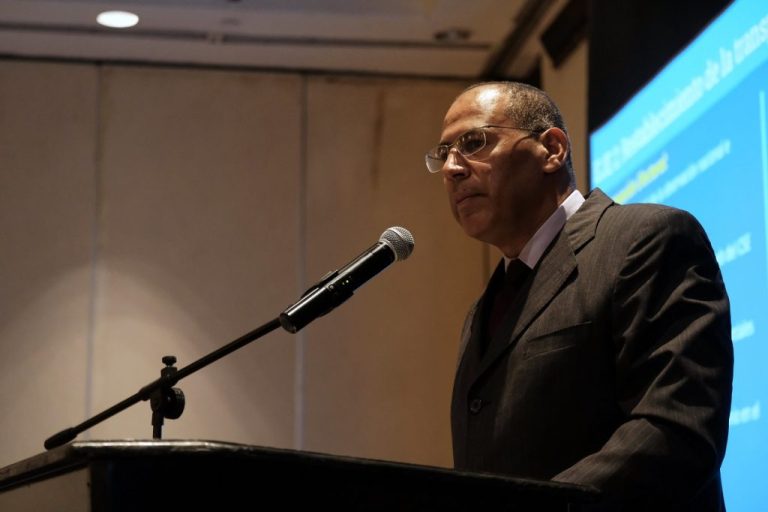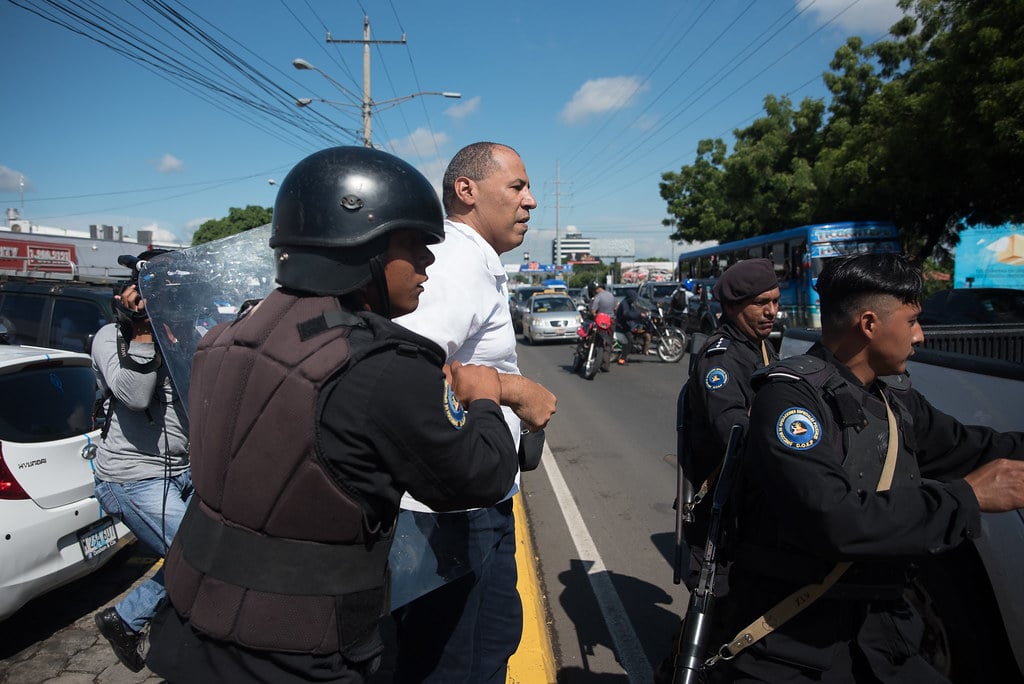27 de julio 2021

European Concern over Lack of Academic Freedom in Nicaragua

PUBLICIDAD 1M
PUBLICIDAD 4D
PUBLICIDAD 5D
Twenty-four hours after the interview with Esta Semana, the promoter of electoral reforms was arrested by the Police.

Peraza explained that with several candidates in jail none of the “enabling conditions” exist to hold free elections. A day later he too was abuducted
Political scientist Jose Antonio Peraza, member of the Electoral Reform Promotion Group (GPRE), warned that some political groups are “normalizing” the electoral process in Nicaragua. This, despite the fact that the country is heading to “the worst electoral scenario that we could have imagined,” with seven presidential hopefuls in jail, and two in exile, political parties without legal status, economically asphyxiated, and without the capacity to complete their campaign preparations.
In an interview on the Esta Semana program, Peraza explained that none of the “enabling conditions” to hold free elections, established by the GPRE in a national consensus agreement have been complied with, and none of the seven points established by the Organization of American States (OAS) were met.
The international community, including most Latin American nations of the OAS, the United States, Canada and European Union, have stated there are no conditions for a free and competitive election, but in Nicaragua it is outrageous that some sectors speak of a so-called “normality,” said Peraza.
“I am concerned that there are national groups that give the impression that we are heading towards a normal election,” said Peraza. “I have seen this tendency in the Superior Council of Private Enterprise (Cosep), in the Constitutionalist Liberal Party and to some extent in “Ciudadanos por la Libertad” (CxL), although somewhat toned down. They act as if we are in a fully-fledged democracy and that everyone will go to their polling place and quietly vote and we are going to have results five hours after the polls have closed. That is not the situation in Nicaragua,” he continued.
It is “outrageous” that after the arrest of the presidential candidates, “anybody (in the country) could be talking about a normal election,” when in reality “we are in an electoral aberration.” In addition, he assessed that the arrest of the presidential hopefuls could negatively impact the moment in which Nicaraguans go to the polls and recalled that -before the beginning of the last repressive wave-, surveys were already showing “a significant decrease” in the decision to participate and vote, mainly among opponents of Ortega’s ruling Sandinista Front.
“I think that after the arresting of the candidates, that (electoral participation) will be even lower than expected. If there is no motivation and a national confluence to confront the dictatorship, we are almost certain that the turnout on November 7 is possibly going to be very low,” noted Peraza.
On the other hand, he emphasized that the lack of electoral observation generates more distrust in the process and the population fears the political persecution of the regime of Daniel Ortega and Rosario Murillo.
“Definitely, what we have seen is that there are no conditions for elections. People are fearful even of expressing their opinion to a pollster. Having reached that situation, you can no longer even trust the information that people are providing you,” the political scientist assessed.
Just this weekend, the Nicaraguan population went to the voting centers to verify themselves in the electoral roll. A process that “has never been massive,” Peraza estimated, but which showed some irregularities that could hinder the voting process.
“There was a reduction in voting centers, around 1,220 approximately. If we estimate that for each voting center there are a little more than 1,000 people registered or eligible to vote, we can estimate that more or less one and a half million people have been moved from their polling place. That is serious because it means more than 20% of the population registered to vote,” he noted.
The change of polling places could cause, “a lot of people have a hard time finding their polling place,” Peraza said. This is because “most people are not aware of those specific electoral issues that are happening almost arbitrarily,” because the Supreme Electoral Council (CSE) “simply does the measure and then says, ‘we did such a thing,’ but does not explain why, or under what criteria.”
Participation in the verification process is not an indicator of what may happen on election day, since in Nicaragua “we haven’t had the registration lists in such a peculiar situation” and the CSE does not provide information. “Anything has to be figured out almost clandestinely,” he added.
Faced with this negative scenario, Peraza regretted that the opposition “Alianza Ciudadanos por la Libertad” (ACxL) has not made a call for “a great national unity to be able to confront the dictatorship.” Instead, they seem to think, and “it is very difficult to believe” that single handedly this political group can obtain a satisfactory result in the elections.
ACxL “has everything against it,” due to its political “sectarianism,” Peraza warned. Furthermore, “the candidates they will probably choose will come from among themselves, therefore, they will not be representatives of the entire Nicaraguan opposition,” he stressed.
Even though since 2019 CxL has repeatedly said that it would not put up a presidential candidate from its own party, in the run-up to candidate registration with the CSE and after the arrest of the candidates, sources from the “Alianza” indicate that in the end Oscar Sobalvarro, current vice president, will be registered by CxL. A choice that was not done by consensus and has caused a schism in the Alianza Ciudadanos por la Libertad, in which the leaders of the Civic Alliance have also expressed their dissatisfaction with CxL.
One day following the above interview was broadcast Jose Antonio Peraza, a political analyst and member of the Blue and White Unity’s political council, was arrested by the Ortega regime on the night of July 26.
His detention brings to 29 the number of politically motivated arrests in Nicaragua since the end of May 2021. Like others in the current “witch hunt” against the opposition, Peraza’s arrest was justified under the guise of supposed “investigations” and accusations of violating Law #1055, the recently passed “Sovereignty Law”, under which they accuse the victim of treason.
According to the police statement issued on Monday night, Peraza was carrying out “acts that undermined sovereignty and self-determination”. No further details were offered about these alleged acts.

Political analyst Jose Peraza during a previous arrest in October 2018 during a protest after the Police State was impose Photo | archive | Confidencial
Before his arrest, Peraza had recorded a video to be circulated if he “was abducted by the dictatorship”.
“As a father, as a citizen, as a member of the UNAB, I am ready to make this and other sacrifices for the freedom of Nicaragua,” Peraza affirms in the video. He adds: “The dictatorship doesn’t scare me. We know it’s living its last moments, and I’ll continue in the struggle. Soon, our beloved Nicaragua will be free, and soon we’ll embrace each other in a democratic, peaceful, prosperous and free country.”
Peraza said in the video that his arrest would be “just one more episode that the regime has created to intimidate and cause suffering to the Nicaraguan people. That will soon be over. This dark night will soon end, and we’ll become the people we’ve always wanted to be: free, peaceful, prosperous and happy.”
On July 24, two days before Peraza’s arrest, the Ortega-controlled police announced that opposition figures Noel Vidaurre and Jaime Arellano had been placed “under police custody”, equivalent to house arrest. The two were accused of the same supposed crimes against national sovereignty.
Twenty-six of the 29 political prisoners jailed in the last two months and held incommunicado were arrested for supposed violations of the catch-all law, approved by the Ortega-controlled National Assembly in December 2020. The law was early on recognized as a “guillotine law”, aimed at inhibiting any political competition in the elections scheduled for November 2021. Seven of the current 29 political prisoners were aspiring presidential candidates. Two others were forced to go into exile to avoid arrest.
This article was originally published in Spanish in Confidencial and translated by Havana Times
Archivado como:
PUBLICIDAD 3M
Confidencial es un diario digital nicaragüense, de formato multimedia, fundado por Carlos F. Chamorro en junio de 1996. Inició como un semanario impreso y hoy es un medio de referencia regional con información, análisis, entrevistas, perfiles, reportajes e investigaciones sobre Nicaragua, informando desde el exilio por la persecución política de la dictadura de Daniel Ortega y Rosario Murillo.
PUBLICIDAD 3D